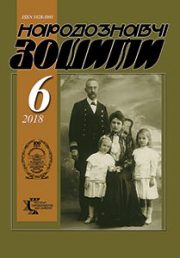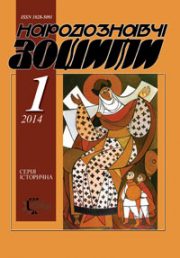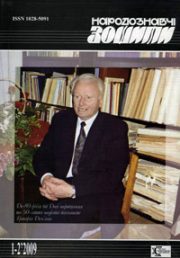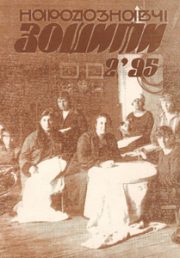The Ethnology Notebooks. 2017, 6 (138), 1388—1393
UDK 392.81 (477) “18/19”
DOI https://doi.org/10.15407/nz2017.06.1388
Received 17.10.2017
Shcherban Olena Vasylivna, Ph.D in History, senior lecturer
at the Kharkiv State Academy of Culture
Bursatskyi uzviz, 4, Kharkiv, 61057, Ukraine,
Contacts: Tel (066) 1845061; e-mail: rector@ic.ac.kharkov.ua
Abstract. About the features of the traditional food culture of residents Dnieper. The attention is focused on the daily menu peasants of average prosperity in weekdays, holidays and weekdays and meatless Lenten celebration. The conclusions are made that formed over more than one millennium diet consisted of natural products was quite nutritious,
but also not led to massive obesity.
Keywords: pottery, culture, food, furnace of cooking, above the Dnieper
REFERENCES
Etnohrafichni materialy. IMFE. F. 2. Od. zb. 11. 95 ark. [in Ukrainian]
Artjuh, L. (1982). Narodne kharchuvannia ukraintsiv ta rosiian pivnichnoskhidnykh rajoniv Ukrainy. Kyiv: Naukova Dumka. [in Ukrainian]
Vovk, Hv. (1995). Studii z ukrains’koi etnohrafii ta antropolohii. Kyiv: Mystectvo. [in Ukrainian]
V., Sch. (1899). Pischa i pit’jo krest’janmalorossov, s nekotorymy otnosiaschymysia siuda obychaiamy, pover’iamy i primetamy. Etnohraficheskoje obozrenije, 1—2, 266—322. [in Russian]
Zahlada, N. (1931). Kharchuvannia v s. Starosillia na Chernihivschyni. In Materyialy do etnolohii (pp. 83—196). Kyiv : Vseukrains’ka akademiia nauk. [in Ukrainian]
KvitkaOsnov’ianenko, H. (1929). Ukrains’ki povisti (Vol. 1). Kyiv: Derzhavne vydavnytstvo Ukrainy. [in Ukrainian]
Kyrchiv, R. (2007). Naddniprianschyna. In S. Pavljuk (Ed.), Mala entsyklopediia ukrains’koho narodoznavstva. L’viv: Instytut narodoznavstva NAN Ukrainy. [in Ukrainian]
Klynovets’ka, Z. (1991). Stravy j napytky na Ukraini. Kyiv: Chas. [in Ukrainian].
Kotliarevs’kyj, I. (1969). Povne zibrannia tvoriv. Kyiv: Naukova Dumka. [in Ukrainian]
Markevych, N. (1860). Obychai, pover’ia, kukhnia i napytki malorossyian. Kyiv: Typ. I. i A. Davydenko. [in Russian]
Molokhovets, E. (1901). Podarok molodym khaziajkam, yly sredstvo k umen’shenyiu raskhodov v domashnem khoziajstve. Sankt—Peterburh: Typ. N.N. Klobukova[in Russian].
P., I. (1889). Narodnyje obychai, pover’ia, primety, poslovitsy i zahadky, otnosiaschyjesia k malorusskoj khate (Materyaly dlia kharakteristiky mirosozertsanyia krest’ianskoho naselenyia Kupianskoho uezda). Khar’kovskyj Sbornyk. Literaturno-nauchnoje prilozhenyje k «Khar’kovskomu kalendariu» na 1889 hod, 3, (pp. 35—66). Khar’kov: Typohrafija Hubernskoho Pravlenyia. [in Russian]
Khmelevskaia, M. (2006). Ekonomnaia kukharka. Khar’kov: Bybleks. [in Russian]
Scherban’, E. (2015). Hlynianaia posuda kak element tradytsyonnoj kul’tury pitanija ukraintsev: postanovka problem. Tradytsyonnaia kul’tura v sovremennom myre. Istoryia edy i tradytsii pitanija narodov mira: Materialy I Mezhdunarodnoho sympoziuma. Moskva: MHU im. M.V. Lomonosova. [in Russian]
Scherban’, O. (2011). «Krasne pys’menstvo» iak dzherelo keramolohichnykh doslidzhen’ kul’tury kharchuvannia doby ukraintsiv doby kozachchyny. Zapovidna Khortytsia: Materialy mizhnarodnoji naukovopraktychnoji konferentsii (pp. 80—83). Zaporizhzhia: А&V.Art.GROUP. [in Ukrainian]
Scherban’,O. (2015). Narodna «mahiia» u vyhotovlenni ta pobutovomu vykorystanni hlynianoho posudu Naddniprianschyny (kinets’ XIX — persha polovyna XX stolittia). The Ethnology Notebooks, 1, 195—205. [in Ukrainian]
Scherban’, O. (2015). Hlynianyj posud Naddniprianschyny iak skladova tradytsijnoi kul’tury kharchuvannia ukraintsiv. In M. Zambzhyts’ka, P. Olekhovs’ka & K.Yakubovs’ka-Kravchyk (Eds.) Suchasni doslidzhennia ukrains‘koi kul‘tury; Wspolczesne badania nad ukrainska kultura (pp. 266—283). Warszawa; Ivano-Frankivs’k: Sowa Sp. [in Ukrainian; in Polish]







